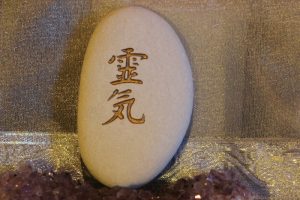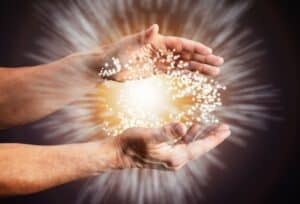Last Updated on December 20, 2022
Reiki is a natural energy healing technique used for reducing physical, mental, and spiritual ailments and improving overall health. The Reiki practice rose to popularity in Japan by a man named Dr. Mikao Usui during the early to mid-1920s. In modern times, Reiki has since spread all over the world as an alternative and complementary form of healing.
The word “Reiki” is a portmanteau of two Japanese words. The first is rei, which means spirit, miraculous, and divine. The second word is ki, which means vital force and energy. Reiki, then, literally means a universal life force.
In a Reiki therapy session, a Reiki practitioner utilizes a lay on hands practice over the client’s clothed body. This encourages the flow of energy within the body, thereby naturally easing the energy blockages and aches. A Reiki session would last anywhere between 20 minutes to 90 minutes.
How Does Reiki Energy Healing Work?

Pinpointing how energy pathways travel across the body is a widely contested topic.
However, the National Center for Complementary and Integrative Health (NCCIH) and other researchers theorize a possible scientific connection Reiki possesses. It was stated that the healing effect supported by energy gets activated on a sub-physical level or a biofield.
A biofield is an energy blueprint that is responsible for the vibrational channels of the full breadth of an organism. Any disruption to this biofield would lead to an outbreak of some form of illness. This energy field is subtle and no study has documented it directly, however.
Despite its vague effects, this concept has long persisted for years, tracing its roots from old traditional and indigenous cultures.
Benefits of Reiki Energy Healing
Reiki activates the parasympathetic nervous system, which is a part of the autonomic nervous system. This contributes to how the technique helps lower blood pressure, heart rate, and increases heart vitality.
People who are experiencing all sorts of physical or mental illnesses can benefit from Reiki. Some of these benefits include:
- Relief from pain, anxiety, and fatigue
- Gives a boost to mood
- Eases headaches
- Improves digestive issues
- Relieves insomnia
What Do You Feel During a Reiki Healing Session?

Patients undergoing Reiki will have vastly different experiences. Most would feel a complete state of relaxation, some to the point of drowsiness.
The range of experiences can encompass many things, however. These include pleasant dreams, a feeling of floating, warmth, or a tingling sensation.
For people who use Reiki to mentally heal, some would feel a healing sensation that’ll cause intense emotions. But in general, many people will feel a sense of comfort and peace during Reiki therapy.
Stories of Reiki Energy Healing
Some anecdotes on Reiki’s effects are shown below on two troubled individuals.
80-year-old Sophia is one such case. She had been searching for something to relieve her aching joint pain. She also wanted to decrease her medicine intake since she relied on them too much.
Reiki provided her the relief she sought. She especially enjoyed the focus on wellness over treatment that Reiki provided. After a few sessions, she could even cut down some medicines with the approval of her physician.
Reiki also supported Caroline, who was suffering from cancer and related anxiety problems. Fortunately, the cancer treatment center she frequented had a Reiki program that she decided to give a shot.
Afterward, Caroline found that Reiki didn’t just reduce her anxiety, but it reduced her pain as well.
Related: What Is a Reiki Therapist?
Where to Find Reiki Energy Healing?
There are three types of Reiki practitioners:
- Reiki professionals, who offer their wellness and therapy sessions or hold community sessions
- Nurses and physicians, who provide complementary Reiki services on top of healthcare
- Non-Reiki professional, who practices Reiki for a smaller crowd, typically just family and friends
Who Founded Reiki?
Dr. Mikao Usui is the promoter of the spiritual practice commonly known as Reiki. Born during the Keio period in the Gifu Prefecture of Japan, Dr. Usui Mikao was a talented and hardworking student. He spent his childhood training in the defensive martial arts technique Aiki, which utilized defensive movements instead of aggressive tactics.
During his early adult years, he traveled all over the world acquiring vast knowledge from physiological and theological fields. Some of the places he had traveled to included the Americas, Europe, and China. His studies covered a wide range of topics, namely history, medicine, Buddhism, Christianity, psychology, and Taoism.
How did Mikao Usui Found Reiki?
He trekked north of Kyoto on a mountain named Mt Kuruma for a 21-day retreat to fast and meditate. He felt the essence of Reiki during his mountain trip, leading him to use the technique upon himself. It worked for him, and when he tried the Reiki practice on his family, their ailments were cured as well.
Satisfied with his findings, he opened a clinic immediately in the Harajuku, Tokyo to promote the healing powers of Reiki. During his career, he had helped thousands of people with this alternative form of healing. He further expanded — opening workshops and a Nakano clinic to offer this alternative form of healing to more people.
His fame skyrocketed after the 1923 Kanto Earthquake, and Dr. Usui found himself in the care of clients all over Japan. He continued performing Reiki health practices to people, up until his untimely death in 1926 due to a stroke.
Now, his remains lie in the Saihoji temple in the Suginami district of Tokyo.
Is Reiki Energy Healing Really Effective?
Yes.
People do get better when they use Reiki as a complementary form of healing. These Reiki benefits include clearing people’s minds, lessening anxiety and pain, and involving the body on a path towards health.
While a Reiki practitioner would undoubtedly praise the powers of Reiki, some medical researchers see the practice a different way. Medical researchers provide scientific treatments for illnesses rather than treatments that promote wellbeing throughout the body. So it’s reasonable that they’re wary of Reiki’s mystical properties.
Homeostasis, or systemic balance, is the closest equivalent trained medical practitioners can apply with the Reiki healing practices. Yet still, there’s no clear definition or point of insertion to tell how Reiki promotes balance in the system. Given this, extensive research has been conducted to understand Reiki’s effects on the human body.
A review of studies shows insufficient evidence on Reiki in treating anxiety and depression in participants aged 16 and older.
In another study published in BMC Nephrology, results showed a positive, non-traumatic pain reduction on patients on dialysis. The Reiki technique makes those dialysis patients feel like they’re contributing to soothing their pain.
All that said, Reiki’s scientific roots remain a mystery. Despite the unwavering opinions of critics, there’s an equally affirming crowd that experienced the true benefits of Reiki.



